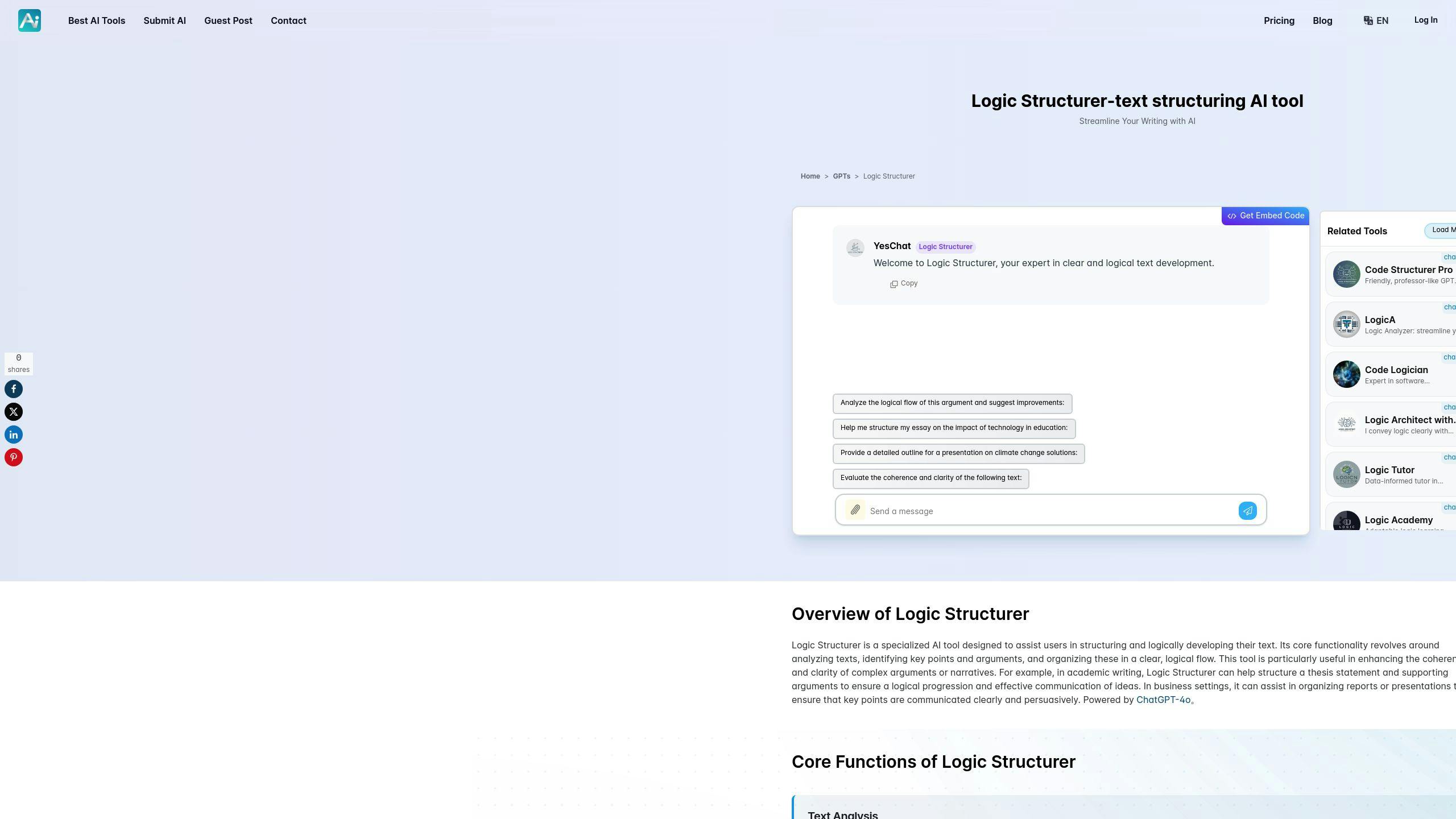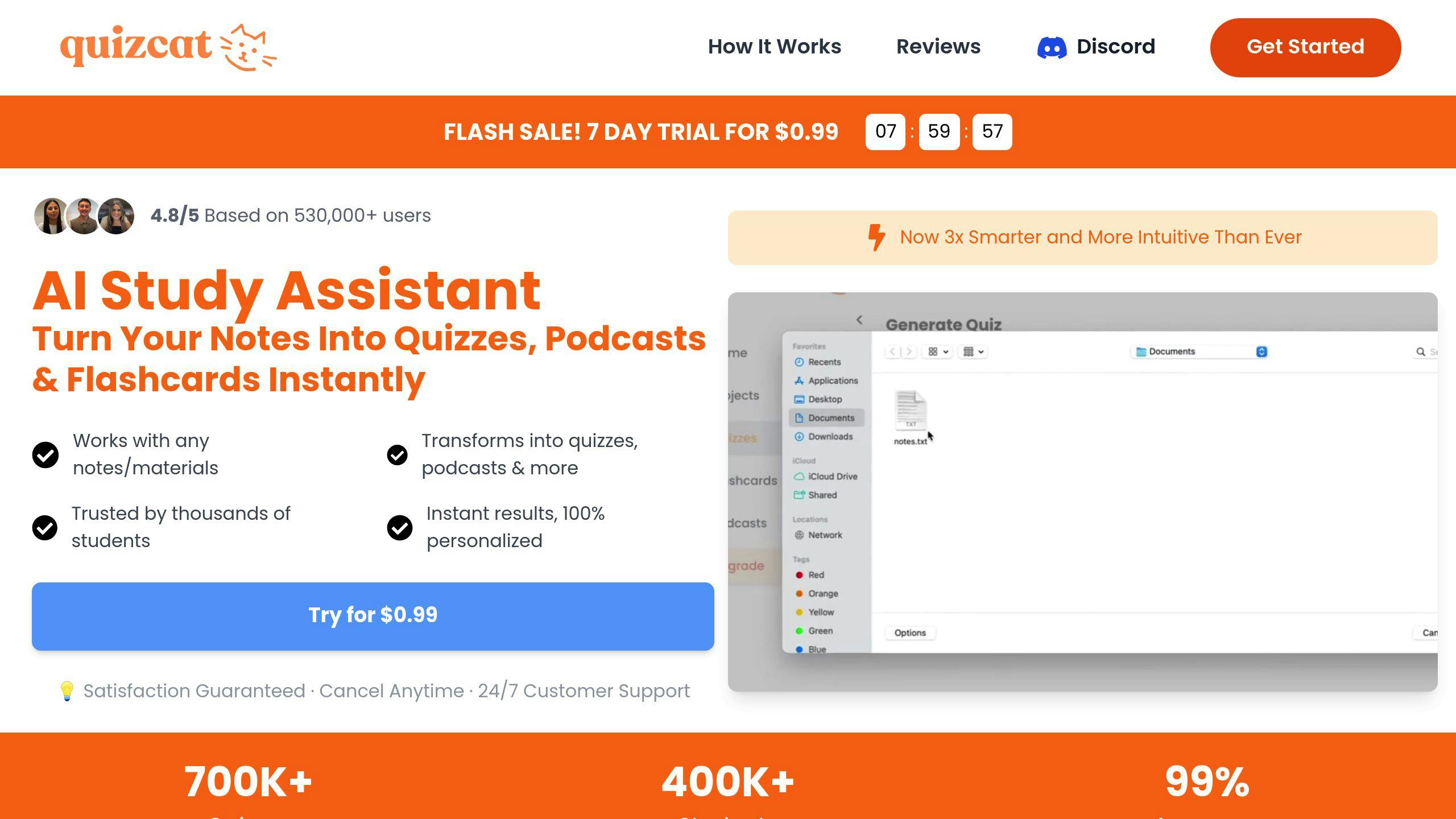
AI Tools for Logical Consistency in Writing
AI tools make writing more structured and logical. They help spot gaps in arguments, improve flow, and enhance clarity, making them valuable for academic and professional work. Here's a quick overview:
- Why it matters: Logical consistency ensures clear, trustworthy communication.
- How AI helps: Tools analyze argument flow, detect errors, and suggest improvements.
- Key tools:
- Logic Structurer: Focuses on argument organization, ideal for legal and business writing.
- Prism's Thesis AI Generator: Creates thesis statements and aligns arguments.
- Jenni AI: Offers academic writing support, including citation management.
- QuizCat AI: Strengthens concept understanding for better writing.
Quick Comparison
| Tool | Primary Focus | Best For | Key Features |
|---|---|---|---|
| Logic Structurer | Logical flow, argument organization | Legal and business writing | Analyzes text, organizes arguments |
| Prism's Thesis AI | Thesis development, argument alignment | Academic essays and research papers | Generates theses, supports evidence alignment |
| Jenni AI | Academic writing, citation management | Comprehensive academic writing | Autocomplete, paraphrasing, plagiarism detection |
| QuizCat AI | Concept understanding | Subject mastery | Interactive learning tools |
These tools support, not replace, your writing skills. Choose based on your specific needs and goals.
AI Writing Tools for Logical Consistency
Features of AI Tools for Logical Consistency
AI tools play a key role in ensuring logical consistency in writing. They focus on detecting gaps, improving structure, and refining clarity, making them essential for crafting well-reasoned content.
Spotting Logical Gaps and Errors
AI tools like Logic Structurer excel at identifying weak points and reasoning errors in arguments. By analyzing how ideas progress, they flag missing connections and suggest ways to tighten the argument's framework [2]. This ensures that conclusions flow naturally from their premises, leaving no room for logical inconsistencies.
Enhancing Argument Structure
Tools such as Prism's Thesis AI Generator improve the organization of arguments by reviewing topic sentences, spotting missing evidence, and suggesting better transitions [3]. These features help present complex ideas in a clear, logical order, making arguments easier to follow and understand.
Improving Clarity and Coherence
For proofreading, tools like Jenni AI focus on transitions, organization, and readability [2]. They ensure the writing remains clear and coherent while maintaining the necessary academic depth, helping writers connect with their audience effectively.
| Feature Category | Primary Functions | Benefits |
|---|---|---|
| Logical Analysis | Pinpoints gaps in reasoning and argument flow | Builds a strong logical foundation |
| Flow Enhancement | Improves transitions between ideas | Creates a smoother reading experience |
| Clarity Check | Simplifies complex ideas | Makes content easier to understand |
| Coherence Review | Refines overall structure and organization | Strengthens the presentation of ideas |
These capabilities are at the core of many leading AI tools, which will be discussed in the following section.
sbb-itb-1e479da
Overview of AI Tools for Logical Consistency in Writing
AI writing tools provide a variety of options to improve logical consistency in academic and professional writing. Below are some key tools and what they bring to the table.
Logic Structurer

Logic Structurer helps ensure a smooth flow of ideas by analyzing and organizing arguments. This makes it especially useful for academic and business writing. It shines in handling complex documents like legal texts, where maintaining a clear progression of ideas is critical [2].
Prism's Thesis AI Generator
Prism's Thesis AI Generator specializes in creating thesis statements and aligning arguments effectively. It assists writers in developing clear, focused thesis statements and ensures that supporting arguments are logically tied to the main idea.
Jenni AI

Jenni AI boosts academic writing by offering tools for clarity, coherence, and citation management [3]. Features like AI autocomplete, paraphrasing, and real-time feedback help improve the structure of arguments and maintain logical flow, making it particularly helpful for academic papers.
QuizCat AI

QuizCat AI takes an indirect approach, supporting logical consistency by helping users better understand complex concepts through interactive learning. While not a primary tool for writing, it can improve argument clarity by strengthening the user's grasp of the subject matter.
Each of these tools takes a different approach to enhancing logical consistency. Choosing the right one depends on your specific writing needs and goals, as each is tailored to excel in different writing scenarios.
Comparison of AI Tools for Logical Consistency
Comparison Table of Features and Tools
Here’s a quick breakdown of how these AI tools stack up against each other, making it easier to find the one that suits your writing needs:
| Feature | Logic Structurer | Prism's Thesis AI | Jenni AI | QuizCat AI |
|---|---|---|---|---|
| Primary Focus | Logical flow and argument organization | Thesis development and argument alignment | Academic writing and citation management | Concept understanding |
| Key Features | Analyzes text, organizes arguments, handles complex documents | Generates theses, aligns arguments, supports evidence | Autocomplete, paraphrasing, citation management, plagiarism detection | Interactive learning tools |
| Best For | Legal texts and business writing | Academic essays and research papers | Comprehensive academic writing | Subject matter mastery |
| Unique Strength | Advanced logical structuring capabilities | Specialized thesis development | All-in-one academic writing solution | Concept reinforcement |
Choosing the Right Tool
The right AI tool depends on what you’re writing and your specific goals:
- If you're working on professional documents, Logic Structurer is ideal for organizing complex texts like legal documents. Its advanced AI ensures precise argument structuring, making it a go-to for business and legal writing [2].
- For academic writing, Jenni AI stands out by combining logical consistency with tools like citation management and plagiarism detection. It’s perfect for writers who need to maintain academic standards while keeping their arguments on point [3].
- Need help with thesis development? Prism's Thesis AI Generator focuses on crafting strong thesis statements and aligning supporting arguments seamlessly.
- QuizCat AI takes a different approach. It strengthens your understanding of concepts, which indirectly improves your ability to write more logically sound and clear content [1].
When deciding, think about:
- The type of writing you're doing and how complex it is
- How easily the tool fits into your workflow
- Whether you need subject-specific expertise
- The specific features you’ll rely on most
These tools are designed to support your writing, not replace your skills. The best choice is the one that complements your writing style and helps you achieve your objectives.
Conclusion
How AI is Changing Writing
AI tools are now an essential part of improving the clarity and structure of writing across various fields. These technologies help writers spot inconsistencies and refine their arguments, making communication more effective [2]. Tools like Logic Structurer and Jenni AI show how artificial intelligence can assist in keeping writing logically sound [2].
As these tools develop further, their influence on the way we write is only expected to grow.
What’s Next for AI in Writing
The future of AI in writing looks promising, with new features being designed to provide more personalized and seamless support. Emerging advancements aim to combine logical analysis with real-time feedback, offering integrated solutions [3].
Some expected developments include:
- Better understanding of context for more precise analysis
- Improved handling of complex academic or technical content
- Smoother integration with existing writing tools and workflows
- Tools that refine the structure of arguments more effectively
AI's increasing use in education and professional settings points to a shift toward tech-supported writing [3]. However, these tools are best seen as aids to enhance human skills, not as replacements. As AI continues to advance, its role in ensuring logical consistency will likely become even more important in the writing process.
